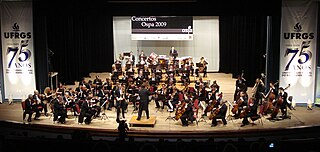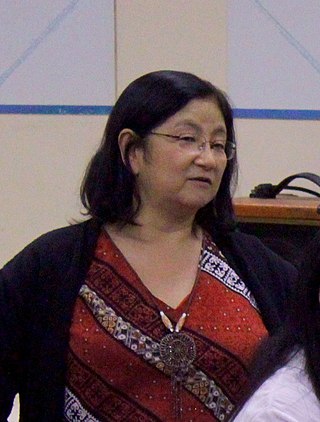
The São Paulo State Symphony Orchestra is a Brazilian orchestra based in São Paulo. The principal concert venue of OSESP is the Sala São Paulo.

Júlio Medaglia is a Brazilian composer, arranger, and conductor. Born in São Paulo, he studied theory and conducting with Hans-Joachim Koellreutter. He continued his studies at the Musikhochschule in Freiburg, Germany, and privately with Pierre Boulez, Karlheinz Stockhausen, and Sir John Barbirolli, with whom he worked as assistant conductor.
Ricardo Tacuchian, born in Rio de Janeiro, is a Brazilian conductor, composer and Doctor in Musical Arts (Composition) at the University of Southern California.
Ricardo Herz is a violinist from São Paulo, Brazil.

Ligia Amadio is a Brazilian conductor, and has been the chief conductor of the Minas Gerais Symphonic Orchestra since March 8, 2023.
Cláudio Ribeiro is a Brazilian conductor.

José Antônio Rezende de Almeida Prado or Almeida Prado was an important Brazilian composer of classical music and a pianist. On Almeida Prado's death, his personal friend, conductor João Carlos Martins stated that Prado had possibly been the most important Brazilian composer ever.
Paulo Costa Lima is a senior Brazilian composer and music theorist, which has won more than 20 national and international Prizes and Commissions along his career. A member of the Brazilian Academy of Music, Lima's main interest is the interaction between composition and culture, including its political aspects, namely composition as a way of resisting colonization and against the "waste of experience," the traditional circuit in which ideas (theory) are produced elsewhere and absorbed by the peripherical South of the Globe, as if the experience of populations in the periphery would be incapable of producing theory grounded musical practices. Lima's publications are on topics such as the theory and pedagogy of musical composition, analysis and history of Brazilian contemporary music analysis of Brazilian popular songs, the possible dialogue between music and psychoanalysis, and cultural semantics. Lima's compositional interests include the rhythmic tradition of the Candomblé. From 2020 on, Lima has been posting short video analysis of Brazilian popular songs generating great interest in the social media, leading to a public of more than 200.000 people

John Neschling is a Brazilian orchestral and operatic conductor. He was the musical director and the chief conductor of the Orquestra Sinfônica do Estado de São Paulo from 1997 to 2008.

Fabio Costa is a Brazilian-born composer, conductor and pianist. He is also active as a composer of microtonal music.

The Porto Alegre Symphony Orchestra is a Brazilian orchestra based in Porto Alegre, in the state of Rio Grande do Sul. It was founded in 1950 under the direction of the Hungarian conductor Pablo Komlós. Since January 22, 1965, the Porto Alegre Symphony Orchestra is a foundation funded by the state government of Rio Grande do Sul.
Roberto Ricardo Duarte is a Brazilian conductor, pianist, and musicologist, known particularly for his international promotion of Brazilian music.
Gian Luigi Zampieri is an Italian conductor.
David Machado (1938–1995) was a Brazilian maestro and a conductor.

The Piano Concerto No. 3, W512, is a composition for piano and orchestra by the Brazilian composer Heitor Villa-Lobos, written in 1952–57. A performance lasts about 26 minutes.
The Brazilian Symphony Orchestra is a Brazilian orchestra. Founded in 1940, it is located at Avenida Rio Branco, downtown Rio de Janeiro. It is one of the country's foremost orchestras, performing more than 5,000 concerts since its inauguration.
Lívio Romano Tragtenberg is a Brazilian musician, composer, music theorist, professor and record producer.

Roberto Minczuk is a Brazilian conductor, maestro of the São Paulo Municipal Symphony Orchestra, music director of the New Mexico Philarmonic laureate of the Calgary Philharmonic Orchestra, artistic director of the Campos do Jordão Winter Festival, and conductor emeritus of the Brazilian Symphony Orchestra.

Naomi Munakata was a Japanese-born Brazilian choral conductor and academic teacher based in the city of São Paulo. She was conductor of Coro da OSESP, the choir of the Orquestra Sinfônica do Estado de São Paulo, from 1995 to 2013, and then principal conductor of Coral Paulistano Mário de Andrade at the Municipal Theatre. She was among the choral conductors in South America who "have contributed to the strengthening and stimulation of choral music", according to The Cambridge Companion to Choral Music.

The São Paulo Municipal Symphony Orchestra, also known as OSM, is one of the artistic bodies of the Municipal Theater of São Paulo. Currently under the direction of Roberto Minczuk, it performs in operas and concerts, often with guest soloists and other artistic ensembles such as the São Paulo Municipal Lyric Choir and the São Paulo City Ballet.











